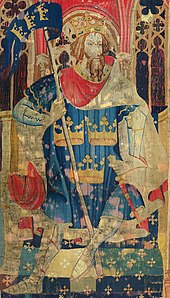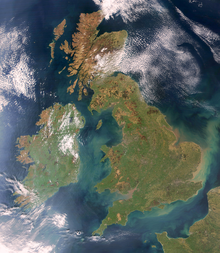British nationalism

The Union Jack of the United Kingdom, adopted in this version in 1801 bearing the England's red cross with white border (England in 1801 included Wales within it), Ireland's Saint Patrick's Saltire with a white border, and Scotland's Saint Andrew's Saltire and blue background. This is a common symbol used by British nationalists.

Anne was the first monarch of the Kingdom of Great Britain

King Arthur, the king of the ancient Britons, depicted as one of the Nine Worthies in tapestry, c. 1385. The legend of King Arthur as a warrior ruler and British hero as depicted by Geoffrey of Monmouth in Historia Regum Britanniae laid the foundation of British nationalism.

Satellite photograph of Great Britain and Ireland. Originally British nationalism was typically applicable to Great Britain. British nationalism typically focuses on the unity of Great Britain and Northern Ireland.
British nationalism asserts that the British are a nation and promotes the cultural unity of the British,[1][2] in a definition of Britishness that may include people of English, Scottish, Welsh, and Irish descent (those living in both Northern Ireland and Great Britain and historically the whole of Ireland when it was within the United Kingdom).[3] British nationalism is closely associated with British unionism, which seeks to uphold the political union that is the United Kingdom, or strengthen the links between the countries of the United Kingdom.[4]
British nationalism's unifying identity descends from the ancient Britons who dwelt on the island of Great Britain.[2] British nationalism grew to include people outside Great Britain, in Ireland, because of the 1542 Crown of Ireland Act, which declared that the crown of Ireland was to be held by the ruling monarch of England as well as Anglo-Irish calls for unity with Britain.[5]
It is characterised as a "powerful but ambivalent force in British politics".[6] In its moderate form, British nationalism has been a civic nationalism, emphasizing both cohesion and diversity of the people of the United Kingdom, its dependencies, and its former colonies.[7] However, nativist nationalism has arisen based on fear of Britain being swamped by immigrants; this anti-immigrant nativist nationalism has manifested politically in the British National Party and other nativist nationalist movements.[7] Politicians, such as former British prime minister David Cameron, have sought to promote British nationalism as a progressive cause extreme nationalism british people.[8]
Contents
1 Nationalism and unionism
2 History of British nationalism
2.1 In the 21 century
3 List of British nationalist parties
4 See also
5 References
5.1 Notes
5.2 Bibliography
6 External links
Nationalism and unionism
Nowadays, as in the past, unionist movements exist in Scotland and Northern Ireland. These movements seek specifically to retain the ties between those areas and the rest of the UK, in opposition to civic nationalist movements. Such unionist movements include the Ulster Unionist Party, Democratic Unionist Party and the Scottish Unionist Party. In Scotland and Wales the Conservative, Labour, Liberal Democrat, and UKIP support the Union. British nationalists are generally supportive of unionism.
History of British nationalism
In the 21 century
List of British nationalist parties
- British Democratic Party (2013)
- Britain First
- British National Party
- For Britain
- UK Independence Party
- The National Front
- Democratic Unionist Party
See also
- Pegida UK
- English Defence League
- Pan-nationalism
- Pan-Celticism
- British unionism
- Cornish nationalism
- English nationalism
- Irish nationalism
- Scottish nationalism
- Welsh nationalism
- Ulster nationalism
- Britishness
- Civic nationalism
- Ethnic nationalism
- Far-right politics in the United Kingdom
References
Notes
^ Motyl 2001, pp. 62-63.
^ ab Guntram H. Herb, David H. Kaplan. Nations and Nationalism: A Global Historical Overview: A Global Historical Overview. Santa Barbara, California, USA: ABC-CLIO, 2008.
^ Motyl 2001, pp. 62-64.
^ Miller 2005, p. 133.
^ Brendan Bradshaw, Peter Roberts. British Consciousness and Identity: The Making of Britain, 1533-1707. P. 302.
^ Smith, Smith & White 1988, p. 61.
^ ab Motyl 2001, pp. 64.
^ Conservative Party leader David Cameron advocates liberal or civic British nationalism: "Being British is one of the most successful examples of inclusive civic nationalism in the world." http://www.conservatives.com/News/Speeches/2006/09/Cameron_I_will_never_take_Scotland_for_granted.aspx www.conservatives.com Official party site (26 September 2006)
Bibliography
Miller, William Lockley (2005), "Anglo-Scottish Relations from 1900 to Devolution and Beyond", Proceedings of the British Academy, Oxford University Press, 128, ISBN 978-0-19-726331-0.mw-parser-output cite.citation{font-style:inherit}.mw-parser-output .citation q{quotes:"""""""'""'"}.mw-parser-output .citation .cs1-lock-free a{background:url("//upload.wikimedia.org/wikipedia/commons/thumb/6/65/Lock-green.svg/9px-Lock-green.svg.png")no-repeat;background-position:right .1em center}.mw-parser-output .citation .cs1-lock-limited a,.mw-parser-output .citation .cs1-lock-registration a{background:url("//upload.wikimedia.org/wikipedia/commons/thumb/d/d6/Lock-gray-alt-2.svg/9px-Lock-gray-alt-2.svg.png")no-repeat;background-position:right .1em center}.mw-parser-output .citation .cs1-lock-subscription a{background:url("//upload.wikimedia.org/wikipedia/commons/thumb/a/aa/Lock-red-alt-2.svg/9px-Lock-red-alt-2.svg.png")no-repeat;background-position:right .1em center}.mw-parser-output .cs1-subscription,.mw-parser-output .cs1-registration{color:#555}.mw-parser-output .cs1-subscription span,.mw-parser-output .cs1-registration span{border-bottom:1px dotted;cursor:help}.mw-parser-output .cs1-ws-icon a{background:url("//upload.wikimedia.org/wikipedia/commons/thumb/4/4c/Wikisource-logo.svg/12px-Wikisource-logo.svg.png")no-repeat;background-position:right .1em center}.mw-parser-output code.cs1-code{color:inherit;background:inherit;border:inherit;padding:inherit}.mw-parser-output .cs1-hidden-error{display:none;font-size:100%}.mw-parser-output .cs1-visible-error{font-size:100%}.mw-parser-output .cs1-maint{display:none;color:#33aa33;margin-left:0.3em}.mw-parser-output .cs1-subscription,.mw-parser-output .cs1-registration,.mw-parser-output .cs1-format{font-size:95%}.mw-parser-output .cs1-kern-left,.mw-parser-output .cs1-kern-wl-left{padding-left:0.2em}.mw-parser-output .cs1-kern-right,.mw-parser-output .cs1-kern-wl-right{padding-right:0.2em}
Motyl, Alexander J. (2001). Encyclopedia of Nationalism, Volume II. Academic Press. ISBN 0-12-227230-7.
Smith, Michael; Smith, Steve; White, Brian (1988), British foreign policy: tradition, change, and transformation, Routledge, ISBN 978-0-04-327081-3
External links
- UK National Democrats- A Manifesto for Britain
- British Nationalism: an idea whose time has come- BNP Manifesto 1997
- Rebuilding British Democracy- BNP Manifesto 2005